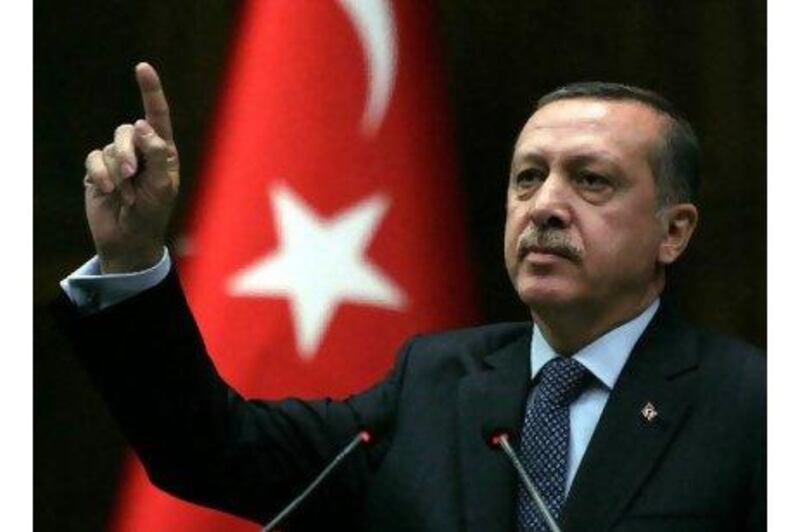ISTANBUL // In a sign of rising tensions between two countries vying for a regional leadership role, Egypt has told Turkey to stop meddling in its affairs by calling for a quick resignation of President Hosni Mubarak.
Abderrahman Salaheldin, Egypt's ambassador to Ankara, said in an interview on Turkish TV this week: "There is actually a unanimous call by the people of Egypt - not by the government, but by the people in the street: 'Keep out'. We are against any foreign intervention."
Mr Salaheldin said the interest of the outside world in Egypt should not turn into interference. "Egyptians are the ones who are going to decide what to do and when to do it."
The ambassador's statement came as Recep Tayyip Erdogan, the Turkish prime minister, repeated his demand that the Mubarak government should step down as soon as possible.
"The process of transfer [of power] has to start immediately, and it has to be short," Mr Erdogan told deputies of his ruling Justice and Development Party (AKP) in Ankara. "A transitional government has to be named, and it has to be acceptable to all sides." The prime minister added that there should be "just and free elections under supervision by international observers" in Egypt.
Mr Erdogan rejected the criticism directed against Turkey. "Just like the problem in Palestine is not a domestic issue, a people's wishes, expectations and calls for a humane life are no domestic matters," he said. "We do not want to meddle in anyone's domestic affairs."
As the Mubarak government has come under pressure, Turkey has been touted as a model because it is a western-style democracy with a Muslim population. During a visit to Turkey this week, Esref Abdulgaffar of the Muslim Brotherhood in Egypt said Turkey was one country that could set an example for Egypt.
Mr Salaheldin rejected that idea. "I don't think that any country can be copied by others," he said in the interview. "Egypt is not Turkey, and Turkey is not Saudi Arabia."
The ambassador is not the only member of the Egyptian government who is irked by Turkey. In an unusually blunt statement released last week, the foreign ministry in Cairo singled out Turkey as a main offender when it came to foreign demands that Mr Mubarak step down. The statement said that "it is extremely regrettable to find western foreign countries such as the USA, UK, France and even Turkey, which searches for a role in any situation, poke their noses in Egypt's current developments".
The reference to Turkey is telling because it throws a spotlight on how Egypt, a traditional leader of the Arab world, views Ankara's ambition to become a regional power broker. Both Egypt and Turkey are important US allies, but Cairo may be afraid that it will be overshadowed by Ankara.
"They see that Turkey is getting more important, and they are concerned," Veysel Ayhan, an expert on Egypt at Ankara's Centre for Middle Eastern Strategic Studies, or Orsam, told The National.
Meanwhile, Ahmet Ali Sabul Gheit, Egypt's foreign minister, sent a letter to his Turkish counterpart, Ahmet Davutoglu. Mr Gheit "tried to explain what transpired in the last two weeks in his country", a high-ranking Turkish diplomat said. "In no part in this letter was anything that said that Turkey should not interfere." Mr Davutoglu replied with his own letter, in which he expressed Turkey's hope that the Egyptian people's demands would be met and that "things will calm down", according to press reports and the diplomat.
Under Mr Erdogan, Turkey has adopted a foreign policy that sees the country as a regional power and key mediator in its vicinity. Buoyed by political stability at home and a booming economy, Ankara has improved relations with Syria, Iraq and Iran and has started to get more involved in the region.
Most recently, Turkey tried to defuse the row about Iran's nuclear programme and joined international efforts to find a solution to the crisis in Lebanon. At the same time, Mr Erdogan has become a popular figure for many people in Arab states because of his harsh rhetoric towards Israel that stands in contrast to the cautious statements of Arab leaders such as Mr Mubarak.
Mr Erdogan has also made much of the fact that he regularly talks about Egypt with the US president, Barack Obama. In his speech to the AKP deputies, he underlined that he and the US president agreed on the need for a speedy transfer of power in Cairo. "We have had two conversations within six days with US president Obama," Mr Erdogan said.
It is not only Turkey's new foreign policy and the international buzz it has created that has aggravated Cairo, Mr Ayhan said. Ankara's credibility in the Middle East also played a role. Resignation demands coming from the US were one thing, because Egyptians did not trust the Americans, he said. "But if Turkey says something like this, it has an effect throughout the region."
As for the criticism coming from Cairo, Mr Ayhan said the Erdogan government probably was not concerned. Ankara knew that the Turkish position was shared by people on the street in Cairo and by important sectors of Egyptian society such as young officers in the military, academics and journalists. By contrast, many people in the government in Cairo "will not be there much longer", he said.





